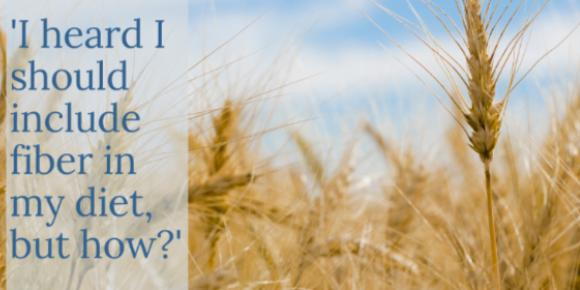
Fiber is a carbohydrate found naturally in plants, and is not digestible by humans. And while it sounds like that's the last thing you want to eat, it's very important that you do. There are some carbs that are bad for you, and only increase the weight you're trying to lose. But, there are types of carbs that are good for you, and fiber is one of them.
But what is Fiber? How does it help me?
It is an essential part of our body operating properly, yet many of us don’t get the required amounts to keep us running. It is vital to help keep our digestive system working properly, and by traveling down our system it is helping nutrients be absorbed into our body, and bulks our stool. It is important to acknowledge that while you may think “Fiber is Fiber” , there are many different types based on what your diet is lacking and what your body needs.
There are two main types of fiber, Soluble and insoluble. Soluble attracts water to create a gel like environment. This then slows the process of digestion having you feel fuller longer aiding in weight loss. Insoluble fiber however repels water, collecting only the food the body cannot absorb to help bulk up stool and help expel toxins more regularly. It is important to bulk it up in order to efficiently move through the digestive system. Foods that are considered soluble fibers include legumes, oats, edible plant skin and some types of nuts. You'll recognize oats as being one of the most common sources of fiber but look close that there are many other forms you may not have noticed. Vegetables, fruits, oats and nuts, wheat bran and whole grain foods are excellent insoluble fibers to help control and clean out your insides.
Think of fiber as nature's scrub brush, cleaning out your digestive tract to help you start clean and fresh. A common illness found in Americans is called Diverticulitis. This is where partially digested food gets trapped in pockets of the digestive tract and becomes infected from being there for so long. Serious cases could result in surgery and hospitalizations to fix the damaged sections of the tract. By eating a high fiber diet ensures that all loose foods will be collected and expelled, instead of contracting germans and bacteria.
Another great benefit of fiber is that it could actually extend your life. By preventing heart disease, type 2 diabetes, obesity, and stroke, eating fiber helps control what positive nutrients are absorbed into your digestive system and help toxins harmful to your body be expelled. Soluble fibers also control your blood sugar level, making sure not too much is introduced into the body from the digestive tract and ensuring your remain at a comfortable homeostasis at all times. Also If you're looking to lose weight, I recommend ensuring you are getting enough fiber. Insoluble fiber promotes satiety through the GI Tract, helping give the appearance of you being full when you haven't physically eaten that much. This helps with weight loss to keep you from snacking, and controlling your blood sugar levels.
Fiber can help stabilize your cholesterol and blood pressure levels as well. “Here’s how it works: Your body uses bile salts, which are excreted by the gallbladder https://www.everydayhealth.com/gallbladder/guide/symptoms/ to break apart the fat content in food. Bile salts are made of cholesterol. When you eat food with fiber, the fiber binds to the bile salts, preventing them from being recirculated for the next time you eat. As a result, your body must produce more bile salts by taking cholesterol from the liver. This is how soluble fiber reduces blood cholesterol. Fiber has a preventative role on blood pressure, too, but the reason is more associated with nutrients such as potassium https://www.everydayhealth.com/pictures/foods-high-in-potassium/ , calcium, and magnesium contained in foods high in fiber.” (Angela Lemond, RDN)
I don't know if I can keep up with the recommended amount of fiber, do I have other options?
Yes! The recommended amount of fiber is 25-38 grams per day. Many American are only intaking 14 grams per day which is way below the safety line, causing fiber to be categorized as a ‘nutrient of concern’ by how little we are taking of it. While I recommend trying to get your fiber intake from natural sources due to the vitamins and minerals in those foods, you have the option of fiber supplements as well. There are many well known such as Metamucil, Dextrin, or Fibercon to help regulate your system and keep you healthy. It is important to understand that regardless of what supplement you are taking that you need to dramatically increase your water intake to compensate. Find below a great tool to use when trying to incorporate more natural fiber into your diet.
Increasing your fiber intake comes with many benefits including guarding against cancer, helping with weight loss, lowered blood pressure and cholesterol, and guarding against constipation.
Not sure where to start? Come in for an appointment and I’ll be able to explain your options with you and walk you through the process of increasing fiber into your diet!
Fruit
* Passion fruit (1 cup): 25g, 100 percent
* Breadfruit (1 cup): 11g, 44 percent
* Raspberries (1 cup): 8g, 32 percent
* Blackberries (1 cup): 8g, 32 percent
* Boysenberries and gooseberries (1 cup): 7g, 28 percent
* Pear (1 medium): 6g, 24 percent
* Prunes (5 pieces): 3g, 12 percent
Vegetables
* Artichoke (1 large): 9g, 36 percent
* Lima beans (1 cup): 9g, 36 percent
* Green peas (1 cup): 8g, 32 percent
* Lentils (½ cup): 8g, 32 percent
* Kidney beans (½ cup): 6g, 24 percent
* Sweet potato (½ cup, mashed): 4g, 16 percent
Nuts and Seeds
* Chia seeds https://www.everydayhealth.com/diet-nutrition/diet/chia-seeds-nutrition-health-benefits-how-cook-more/ (1 ounce (oz)): 10g, 40 percent
* Flaxseeds (1 oz): 6g, 40 percent
* Pumpkin seeds (1oz): 5g, 20 percent
* Almonds https://www.everydayhealth.com/diet-nutrition/diet/almonds-nutrition-benefits-how-eat-more/ (1 oz): 4g, 16 percent
Grains
* Raisin Bran (1 cup): 7g, 28 percent
* Shredded wheat (2 biscuits): 6g, 24 percent
* Oat bran (1 cup): 6g, 24 percent
* Brown rice (1 cup): 4g, 16 percent

